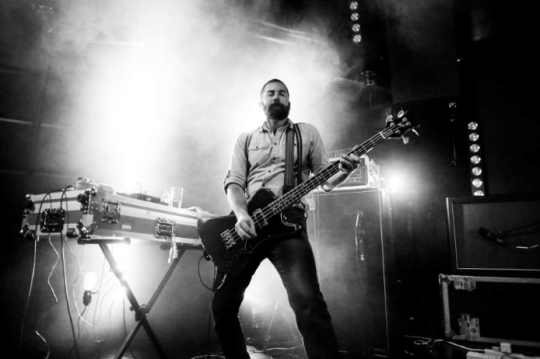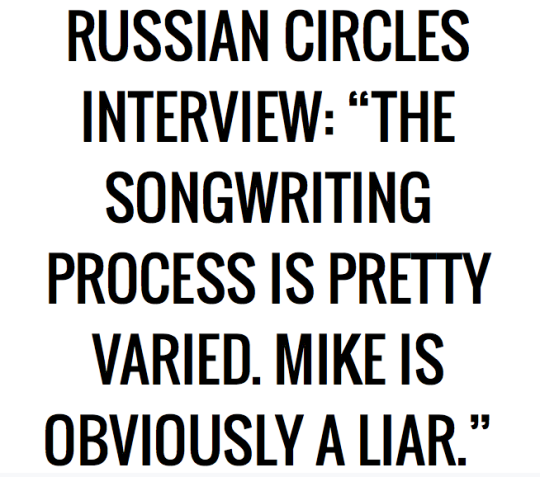


NEW ALBUM GUIDANCE IS OUT NOW VIA SARGENT HOUSE.
There’s not really any need to introduce post metal stalwarts Russian Circles, is there? Suffice it to say, they are now over ten years into their career and have just released yet another excellent album in the form of Guidance. For me, it’s an album that sees the group push out the contrasts between the light and dark in their songs. Songs soar and swoop between pummeling drums and somewhat black metal guitar flourishes like on lead single ‘Vorel‘, and the slow build of more cathartic and euphoric tracks like ‘Mota’. An engrossing adventure as always.
Ahead of their upcoming US and European tour, Overblown had the pleasure of talking to Russian Circles’ bassist Brian Cook about Guidance, recording with Kurt Ballou of Converge, and how Mike (Sullivan, Russian Circles guitarist) is a liar apparently.
Overblown: You worked with the legendary Steve Albini on two records, and on this new album, Guidance, you worked with Kurt Ballou of Converge fame. How are their approaches different and how did that affect the recording of the records?
Answer: Actually, we didn’t record with Steve Albini, We just recorded at his studio, Electrical Audio. But the studio is definitely based around his vision and recording philosophy, which is to replicate the sound of a live band as closely as possible.
I appreciate that approach because my favorite records have a very tangible element of sonic space. I like it when you can hear the room on an album. I like that sense of dimension—that sense that you can hear where all the instruments are situated in a room—and it feels like more and more these days people want their music to sound super compressed and squashed, like everything is battling to be up front.
And there are definitely cool records that make use of that philosophy, but I’d rather hear a more natural sounding album. I’d take John Bonham’s squeaky kick pedal over triggered drums any day of the week. But there are definitely times when you want to employ all the various tricks and technological advancements of recent years that make the process of recording a little less grueling and a bit more fun.
Working with Kurt was great because he still has that no-frills philosophy in his background, but he’s also very keen on making records that sound great in very limited time. He’s less concerned with doing records in a very specific way and more open to making records in a way that suits each individual band. The strange thing is that the recording process for Guidance felt much more traditional and old school than the Memorial album we did at Electrical Audio. That probably had a lot more to do with our level of preparation though.
O: For me, the contrast between beautiful melodic passages and ferocity is even more pronounced on this album. Was that intentional or something that happened naturally?
Answer: It wasn’t intentional. I think we just have diverse musical interests and we’d rather be open to writing whatever feels natural than say “okay, this record is gonna be all heavy”. So our records wind up being exercises in contrast. It’s to the point now where I feel like people are like “oh, this new album is kinda in keeping with the tradition of their past records”, even though our tradition has been to make records that cover a broad spectrum of sound.
O: This is your first record where it is just the three of you without any guest musicians/vocalists etc. How did this affect the writing and recording of the album?
Answer: Weird. I hadn’t even thought about that. In fact, I was going to say you had misinformation, but then I realized Robert Aiki Aubrey Lowe on our first album, Morgan Henderson on our second, Helen Money on our third, a couple of the Secret Machines dudes on Empros, and Chelsea Wolfe on Memorial. I guess we dropped the ball this time around. With the exception of Chelsea, the guest musicians were auxiliary players that just added some extra texture and layering to the music, so I don’t think it really affected the creative process in any significant way.
O: Mike (Sullivan, Guitars) has said that your writing process is pretty set at this point. Do you ever worry that this may lead to stagnation? Do you ever consider mixing things up a bit or is it a case of “if it’s not broken, don’t fix it”?
Answer: There are still a lot of curve balls. “Lisboa” was really all Mike. He wrote the song, sent it our way, and we did very little to the arrangement other than adding the requisite bass and drums. That’s a very different scenario from a song like “Vorel” where we tinker with the parts and structure over a prolonged period of time. “Overboard” was basically two songs that Mike and I wrote independently of each other that somehow worked together. “Asa” was based on a baritone guitar demo I wrote awhile back, and we basically just trimmed down a few parts and ran with it. The songwriting process is still pretty varied. Mike is obviously a liar.
O: You have pretty extensive tour of the US and Europe on the way. After so many years on the road, is there any cities/venues you’re looking forward to seeing again or cities that you’ve never been before that you are looking forward to visiting and playing?
Answer: I like playing new places. My favorite tours tend to be the ones where we venture into new territories. There are obviously cities we love returning to… touring would be really depressing if you didn’t look forward to revisiting cities. But I’m really excited to go to Romania, Macedonia, and Bulgaria on this upcoming tour. I never thought we’d venture that far into Eastern Europe.
O: From reading interviews and watching your progress over the last ten years, it strikes me that you are a band led by gut feelings and what feels right rather than any premeditated plan. Is this perhaps one of the reasons for your longevity?
Answer: I’m not sure what the key to longevity is. Honestly, the band still feels very new to me. Even when we had our ten-year anniversary, all I could think was “well, it hasn’t been ten years for me because I only started playing with the guys in 2007.” But now it’s been almost 10 years since I joined up, and I’ve been in the band longer than I was in These Arms Are Snakes and almost as long as Botch, which both felt like they took up a huge chunk of my life. Maybe it’s just a matter of getting older and feeling the relativity of time. Or maybe it’s just that our willingness to do whatever we want creatively has made the band seem fresh to us even after all these years.
O: Who would you most like to collaborate with? Why?
Answer: Keith Huckins. That dude is a riff machine. Rorschach, Deadguy, Kiss It Goodbye… he really had a flawless track record. I’d collaborate with him just to get him to make music again.
O: What is your favourite record of the year so far? Why?
Answer: I really like the Nonkeen album. I don’t generally listen to much electronic music just because, to me, a lot of it sounds like canned music, or it sounds like it was built on a grid, or—as I mentioned before when we were talking about studios—it sounds like everything is vying to occupy the same sonic space. But that Nonkeen album has a lot of dimension and depth to it. And I dig the whole backstory with the group being an ongoing recording project of childhood friends. And, c’mon, just listen to “Ceramic People”. That song is the jam.